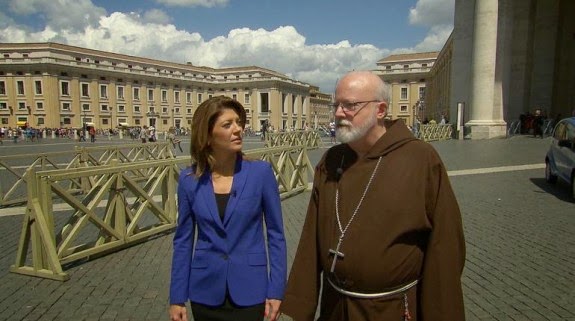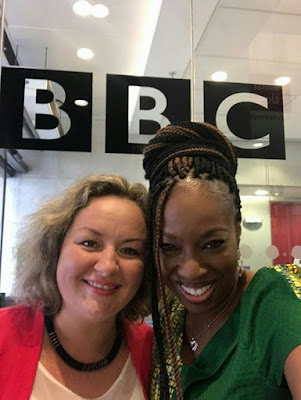Cardinal Sean O’Malley’s surprising comment on ordaining women
There seems to be considerable fuss this morning over some comments made by Primate of Boston, Cardinal Sean O'Malley's comments on "60 Minutes" on Sunday night.
The usually excellent Greg Kandra posted this on his blog:
I guess I wasn’t the only one who did a double-take when I heard this on “60 Minutes” Sunday night:
Catholics who thought Boston Cardinal Sean O’Malley’s remarks about Kansas City Bishop Robert Finn’s suitability for office were provocative have another interesting comment to ponder: If he were to start a church, he would “love to have women priests.”In an interview with “60 Minutes” on CBS that producers said took more than a year for them to persuade him to do, O’Malley seemed troubled by reporter Norah O’Donnell’s question as to whether the exclusion of women from the Church hierarchy was “immoral.”O’Malley paused, then said, “Christ would never ask us to do something immoral. It’s a matter of vocation and what God has given to us.”“Not everyone needs to be ordained to have an important role in the life of the Church,” he said. “Women run Catholic charities, Catholic schools …. They have other very important roles. A priest can’t be a mother. The tradition in the Church is that we ordain men.“If I were founding a church, I’d love to have women priests,” O’Malley said. “But Christ founded it, and what he has given us is something different.”
Errr...What is the problem here? We have enough madness at the moment with good Catholics misunderstanding and spreading confusion. Do we really need to make another scandal out of this?
I love what the Cardinal said here. It says, look, it's not about misogyny, it's about Tradition. If it were up to me I would love to have women priests, but we are not not changing it because we hate women: we love women! Women do loads of important stuff in the Church; if it wasn't for women, there would be no Church! The thing is, I didn't found the Church, Jesus did and if he was going to ordain women priests, who better than His Mother? Or Mary Magdalene? But He didn't. He reserved that special alter Christus role for men, just as He reserved the role of child-bearing for women. That is what we have been handed down, and we do not change what Jesus has given us. We try to understand better why He gave it us. Being Catholic is about a deepening real relationship with God, on His terms, not our own.
Thank you Cardinal Sean! You express Catholic teaching in a contemporary society with humility & orthodox here. Well done indeed!
Coincidentally, isn't it interesting that this story is a source of controversy today, the day the Church of England has formally adopted legislation which means its first female bishops could be ordained next year.




I guess I am one of those people helping to make a fuss.
ReplyDeleteI think it is the Cardinal who is spreading the confusion. I've seen, in response to my own blog post, people saying many things similar to yours. Basically, the Cardinal is showing his vulnerable side or the Cardinal is demonstrating what it means to be faithful in the midst of doubt, etc.
I too like all the things the Cardinal said about women's role in the Church historically and currently. But then he just mucks things up with the, "If I was founding a Church..."' statement.
Christ instituted the seven Sacraments (Catechism, #1210). Imagine if O'Malley had said, "Christ instituted the seven sacraments, but if I was instituting a sacramental system, I'd have eight."
The immediate question, I think, is "Why would O'Malley do it differently than Jesus?" What sacrament did Jesus forget when he was instituting them that O'Malley feels he needs to add?
And then why does he need to add an eighth sacrament? Is it additional Divine Revelation? No that can't be (Catechism, #73).
This is how I see the ordination topic. Holy Orders is one of the seven sacraments instituted by Christ. Presumably Jesus did it correctly being the Son of God and all. So why would O'Malley want to change that if he had a chance to found a Church?
I can see that O'Malley says he follows the Church teaching. That's good. That is what all Catholics should do. But would you ever say, "I'd take what Jesus did and just tweek it a bit"?
Why tweek? What change? Why add anything or subtract from it? Could any of us, lay or cleric, make the sacraments better?
To say, I'd do something different than what Jesus did (the person we're supposed to be loyal followers of) just doesn't make any bloody sense to me!
The role of the bishop is so important! St. Ignatius of Antioch wrote:
"Let all follow the bishop, as Jesus Christ follows his Father, and the college of presbyters as the apostles; respect the deacons as you do God’s law. Let no one do anything concerning the Church in separation from the bishop.
If our bishops our wavering, then lay Catholics will suffer due to the confusion they inject into the public narrative.
Thank you Christopher, I do understand your point. However, rather than saying, "I'd take what Jesus did and just tweek it a bit", I read his comments as saying "It is not a case of 'not wanting women', as the secular agenda keeps reiterating, but that our faith is a Tradition handed down from the Apostles which we cannot change".
DeleteHe's unwise to suggest doing things differently, even with the acknowledgement that he can't. Modern man is so hung up on the idea that everything should be changed by progress that he finds it difficult enough to understand the concept of not being able to change in accordance with modern thought as it is. They will pick up that he would have women if he had the choice (that's the bit they understand) and forget the fact that he can't (which is the bit that is alien to them and they are not prepared to understand).
Delete